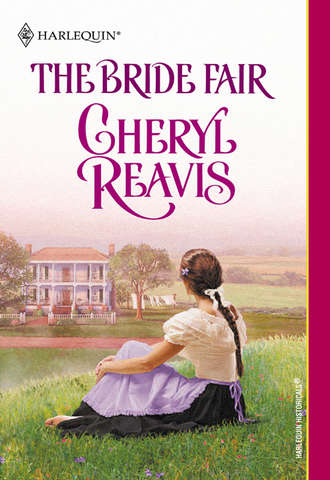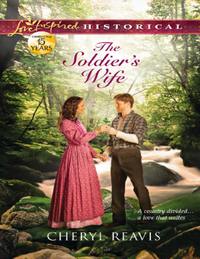
Полная версия
The Bride Fair
She gave him an incredulous look that was wasted in the dark.
“I am not a stable boy, Colonel Woodard,” she said evenly.
“I never said you were. I have injured my hands, and I don’t think I can do it myself. I was in the cavalry, Miss Markham. Regardless of my current duties, old lessons die hard. I must see to my mount no matter what. I don’t want him to stand all night with a saddle on his back. Perkins is off on other business. You are the only other person here at the moment, and you strike me as being reasonably competent. Can we not call a brief truce on behalf of this suffering animal?”
She thrust the lantern back at him so she could undo the cinch. She even pulled the saddle and blanket off while she was at it and dumped them on the back porch.
“Anything else?” she asked.
“He needs to be fed and watered,” he said without hesitation.
“Light the way,” she said, taking the horse by the bridle and coaxing it to limp the distance to the animal shed. She stopped at the trough long enough for it to drink, then urged it into the shed and put it into an empty stall. Her buggy horse, Nell, whinnied softly in the darkness.
“The bridle,” the colonel said behind her, before she could remove it.
She gave a quiet sigh and struggled to unbuckle the bridle, then handed it to him.
“Shine the lantern there,” she said, pointing to a barrel of corn in the corner.
She lifted the lid and reached inside—as much as she hated to when she couldn’t really see where she was putting her hands. It was a carry-over from her childhood, when she once lifted out a rat along with an ear of corn.
“Thank you,” he said as she dumped as much corn as she could grab in one swipe into the stall crib.
She made no effort to acknowledge his expression of gratitude. She pitched a small clump of hay into the crib instead and turned to go. Her only interest now was in taking her “reasonably competent” self back to the house. It wasn’t for his sake that she’d assumed livery duties. She had merely appreciated his remark about a truce and determined that none of God’s creatures should suffer needlessly—regardless of who the human owner might be.
The colonel followed along after her with the lantern.
“I need my trunk opened,” he said as they entered the kitchen. He awkwardly set the lantern on the table.
“It’s in the front hall—”
“The key is in my left shirt pocket.”
She stood looking at him, trying to read the expression on his face. He wasn’t ordering her to do anything—and yet he was. And she was certain that he at least suspected that she was afraid of him. He suspected, and for some reason he was determined to push her until he could make her show it.
But she refused to be pushed. She impulsively reached into his unbuttoned tunic to find the shirt pocket with the ring of keys. This close, he smelled of smoke and horse and tobacco. He needed a shave, and he was clearly exhausted.
“Which key is it?” she asked, avoiding his eyes.
“The one in your hand. It opens the big trunk. I need two rolls of muslin and the bottle of brandy—lower left-hand side.”
She took the lantern and went into the hall. She had wanted to poke through his belongings, and apparently she was going to get the opportunity.
Except that he came with her.
She unlocked the trunk with some difficulty and located the muslin and the brandy—all the while trying to glimpse his personal possessions. A daguerreotype, a book—anything that would validate her already low opinion of the man. She saw nothing but socks and vests—and drawers. He clearly didn’t mind her rummaging through his undergarments in the least. Fortunately, she had had enough brothers not to be alarmed by the sight of normally concealed male clothing.
When she stood up, he was already on his way back to the kitchen. She sighed again and followed, carrying the brandy and the muslin.
“A glass?” he asked. “I’m apt to break things if I look myself.”
She got him one from the shelf, amazed that he expected her to pour, too, and even more amazed that she complied. Her one-handed splash was generous; the spirits didn’t belong to her.
“That’s enough,” he said, holding up an injured hand.
But he didn’t take up the glass. He shrugged off his tunic and held out his arms for her to roll up his shirt-sleeves instead. The shirt was plain but finely sewn and made of a soft, closely woven muslin like the rolls she’d gotten from the trunk. There had been nothing like it available here since before the war.
“If you would be so kind as to bind up my hands,” he said, still waiting for her to get his sleeves out of the way. “The doctor suggests you soak the bandage in cold water first.”
She hesitated, in spite of the fact that she had the skill to do what was needed. The town had had a Wayside Hospital during the war. The trains carrying the wounded had arrived at all hours of the day and night. Even though she was a young, unmarried woman of good family, she had worked around the clock more than once dressing injuries that were so terrible—
She pushed the memory aside. Binding up a soldier’s wounds was an expertise she would have preferred never to have acquired.
Colonel Woodard stood waiting. He had asked—more or less—and she couldn’t, in good Christian conscience, deny him. Whatever small kindness she would extend to a dumb animal she would also extend to him—except that a good Christian conscience had nothing to do with it. She was going to do this for her own sake, for the chance, however remote, that this Yankee might pay his rent and thereby provide her father with the funds she needed to go away.
She rolled up his shirtsleeves. At first she thought his hands must have been burned, but that was not the case. They were very badly bruised and swollen.
She took down a bowl from the china cupboard and placed the rolls of muslin in it, then carried it to the water bucket and filled it full. She could feel the colonel watching her as she worked to saturate the bandages and squeeze out the water.
“Your hands will have to be wrapped tightly to stop the swelling,” she said. “I expect it will hurt,” she added, placing the beginning strip of wet muslin across his palm.
“No matter. That’s what the brandy is for.”
She glanced up at him. He seemed to be expecting her to do just that. She immediately lowered her head and concentrated on the wrapping. She was hurting him, and she knew it. After a moment he half sat on the edge of the table, his hand still extended. She realized suddenly that it was trembling.
“How did you do this?” she asked quietly.
“Someone collected full rain barrels in a wagon and brought them to the fire. The horses shied. My hands were in the way when the load shifted. But your town doctor assures me nothing is broken,” he added. His tone suggested that he didn’t necessarily believe it. “He also said you would be very capable at wrapping them—if I could get you to do it.”
She ignored the remark and tore a split in the last few inches of the muslin, then tied the two pieces in place around the back of his hand. He held out the other one. She wrapped more swiftly now, fully aware that he was inspecting her face while she worked, no doubt verifying his earlier opinion.
“You hate us, don’t you?” he asked.
She looked at him. It was a question he hardly need ask.
“As you do us,” she said after a moment, tearing another slit in the muslin and tying it securely across the back of his hand.
“Perhaps we both have good reason.”
She had nothing to say to that and turned to go.
“Wait,” he said. “I think we need to get the rules of the household established. It will save…misunderstandings later.”
“I see no reason for our separate living arrangements to interfere with each other—”
“They won’t be separate. I expect to be seated at your table for breakfast and—”
“My father is ill. We rarely sit down together in the mornings.”
“Then you will act in his stead—as you did today at the station. If I am to execute my duties well—if I am to put aside my prejudices—I must know and understand the people here. I will have questions and you can assist me with answers—assuming that you want to save your people as much grief as possible. I’m not Hatcher. Things will be different in this town from now on. I also expect to be included when you have guests here for dinner or whatever occasion.”
“Well, you may have to wait a while for that—since we’re all to be kept prisoners in our houses.”
“There are worst places to be imprisoned, Miss Markham,” he said, and in spite of herself she looked away.
“You need not worry about the added work or expense. You have the key to the larder. You may use those provisions freely whether I’m here or not. And my orderly will help you set a proper table or whatever else—”
“I don’t want your charity or your orderly’s help,” she said. “And I don’t want to suffer your presence any more than is absolutely necessary.”
“I’m sure you don’t—but I don’t think I made myself clear. I have the authority to elicit whatever assistance I need from the populace—as I see fit. And at the moment, I require yours. It’s not a matter for discussion.”
He watched her closely. She could sense how much he wanted her to oppose him, and it was all she could do to keep quiet. Her body trembled with anger.
When she said nothing, he abruptly picked up the glass of brandy she’d poured for him and drained it. “Now. If you would show me where I am to sleep—so that I don’t go stumbling about and wake your father,” he said in a deliberate attempt to make it impossible for her to refuse.
She picked up the lantern and walked briskly down the hall and up the stairs, and she didn’t stop until she’d opened the door to the bedchamber off the second-story porch. It had once been hers—until Hatcher appropriated it. She now considered it contaminated and fit only for the likes of his replacement.
“This will do,” Colonel Woodard said behind her. He pushed past her, immediately lay down on the bed as he was, boots and all. And, without giving her a backward glance, he fell immediately asleep.
Chapter Three
Who is talking?
Max turned his head slightly. At first he thought the lowered voices were coming through the window on the upstairs porch. With some effort, he turned over in the bed, realizing immediately that the conversation originated from the other side of the house.
His hands were still wrapped in spite of his restless sleep and still hurt like hell. He flexed them gingerly and immediately regretted it. Even so, the swelling seemed less, and that was something.
He lay there looking around the room. It was sparsely furnished. A four-poster bed, a dresser, a washstand, a chair and small table, somewhat tattered lace curtains, recently washed. No draperies. No rugs. No framed pictures. The wallpaper had seen better days—some kind of stylized flowers in a vase surrounded by a wreath in a pattern that repeated every few inches. A spotty mirror hung from a braided gold cord over the mantel. It tilted downward enough that he could see a dim reflection of himself lying in bed. It was not his first encounter with a well-placed mirror in a bedchamber. The high-class bordellos he’d frequented before the war were full of them. It was a shame this one would go to waste.
“Perkins!” he yelled suddenly, simply to measure his new orderly’s efficiency. He had no idea if the man were anywhere close by or not.
“Sir!” Perkins said immediately on the other side of the closed bedchamber door.
“Coffee,” Max said. “Now.”
“Yes, Sir!”
Max sat up on the edge of the bed with some difficulty, then unwrapped his hands and flexed his fingers again.
Not too bad, Miss Markham, he thought.
He stood and walked unsteadily to the window that opened on the back side of the house. He had initially been too distracted by the pain in his hands to register that everything else hurt, as well. It had been a long time since he’d participated in the kind of physical exertion necessary to put out a fire. Clearly, the days when he could subject his body to any and every kind of strain and misbehavior and not feel any aftereffects were long gone.
He moved the lace curtain aside and looked down into the backyard. The sun was up. The birds were singing, and there was a fine, cool breeze coming in through the window. Maria Markham stood on the dewy grass below and, unless the man with her lived here, she was exhibiting a flagrant disregard for the new curfew.
Max moved slightly to try to hear what they were saying, but he could only catch certain words. From the look of things, however, the conversation was not going well. Whatever verbal bouquets the man was handing out, Maria Markham was not accepting.
“—how could she be better…they need you. Why can’t you see what this is?”
The man reached out to touch her arm, and she stepped away from him.
“You break her heart,” she said. Max heard and understood that quite distinctly.
“I can’t help the way things are—” the man replied.
“Yes, you can!” Maria said, forgetting to lower her voice in her agitation. “Who can but you?”
But then she suddenly relented. “—I will,” she said. “They are always welcome—”
Max looked around at a faint knock on the door.
“In,” he said, and Perkins came in with the coffee.
“Who is that with Miss Markham?” Max asked, nodding toward the window. Even from this distance and without much to go on, he didn’t like Maria Markham’s early morning visitor. It was enough that he was breaking the curfew.
Perkins carefully handed over the tin cup of hot coffee and peered out the window to see.
“You want me to detain him, Sir?”
“No, I want you to tell me who he is.”
“That would be…Phelan Canfield, Sir. Ex-Reb artilleryman. Brother to Miss Markham’s late fiancé and well on his way to becoming the town drunk. He’s married to a friend of Miss Markham’s—Suzanne, her name is. I hear that both the Canfield boys admired Miss Markham, though. Some folks here think maybe Phelan would have turned out better if he’d married her instead of letting his brother have her—on account of she would have made something out of him. Besides that, her brothers—if they had lived—would have half killed him for the kind of misbehavior he’s been showing. Good men, her brothers, or so folks say. But you never know about these things that might have been, do you, Sir?
“Anyway, Canfield and this here Suzanne has got two children—little boys. One’s five—his daddy got to come home on horse leave one winter and that’s where he come from. The other one’s about two or so. Suzanne—now, she ain’t well enough to look after them or keep up her wifely duties, if you know what I mean, Sir. Most of the time Canfield ain’t sober—or he’s disappeared someplace and nobody knows where he got to. It’s usually jail for being drunk and disorderly or one of the whorehouses down by the railroad tracks. He ain’t got enough money to gamble or partake—but I reckon some of the girls take pity on him, him being a Reb war hero and all that.”
Max stared at his orderly. “How the hell do you know all this?”
“People talk, Sir. Alls I do is pay attention when they do it. Most of the folks here work so hard at ignoring us, I reckon they really do forget we’re around. But I ain’t deaf. You can hear all kinds of things at the bakery—it’s on the ground floor down at the hotel—Mansion House. And Miss Markham—she’s come down to the jail a time or two looking for the son of a bitch and thinking he’s been on another one of his binges and got hisself locked up. She takes care of them little boys right much and Suzanne, too. Them boys are a handful—you remember, I did mention, Sir, that this might not be the most restful place for you here.”
Max declined to comment. He held the cup precariously with both hands, savoring the warmth against his painful fingers, and sipped his coffee. After a moment he moved to the window and looked out again—at approximately the same instant Maria Markham glanced up and saw him. She immediately sent Phelan Canfield on his way and went into the house.
“Any chance of getting breakfast, Perkins?” Max asked.
“I believe it’s in the making, Sir.”
“You ‘believe’?”
“Well, Sir, I did get myself run out of the kitchen pretty quick—so I can’t be exactly sure.”
“What the hell did you do?”
“Showed up, Sir,” Perkins said. “That’s about all it took.”
“Perkins, the Markham woman is only this high,” Max said, holding up an aching hand in a fair estimation of her tallness.
“Yes, Sir, but she had this here broom and even if she didn’t use it, she was about to cry—so I just thought I’d let her win this one. And as long as I was shoved out yonder in the backyard, I got me a campfire going to make the coffee. And I seen to your mount—checked the hooves and got the farrier up here. So that’s been done. I got the wash pot filled with water and a good fire under it, while I was at it. It ought to be hot enough about now. Would you be needing it for a shave and the like, Sir?”
“I would,” Max said. “Tell Miss Markham I said to hold breakfast until I’m ready.”
Perkins made a small sound. Just enough of one to let Max know his orderly wasn’t altogether looking forward to another encounter with the daughter of the house.
“Tell her just like that, Sir?” he asked.
“Exactly like that, Perkins.”
A “shave and the like” didn’t take nearly as long as it might have. Perkins had already set up a place in a small connecting room—in what Max guessed had once been a nursery—Maria Markham’s perhaps. The orderly had the tin tub more than half filled. All that remained was carrying the hot water upstairs from the wash pot in the backyard. The biggest delay was caused by finding a wearable tunic. The one he had arrived in had numerous holes burned in it from the sparks at the fire.
Still, the wait would likely not sit well with Maria. It was yet another “inconvenience” he didn’t mind perpetrating—or so he thought until he came downstairs. She had gone to a great deal of trouble from the smell of things—fresh bread, cooked apples, fried meat of some kind—bacon or ham—and coffee.
Mr. Markham greeted him in the hall, a stately-looking man in a threadbare frock coat, if somewhat frail. Maria Markham must have taken after her mother. Max could see no family resemblance.
“Good morning, Colonel! And a fine morning it is. This way, if you please,” the old man said, leading him into the dining room. “I trust you slept well?”
“Quite well,” Max said, the lie coming easily. He had had months of practice when he was still recuperating at home after his imprisonment. Both his mother and his sister, Kate, had asked him that every morning, and every morning he had lied. The truth was that he couldn’t remember the last time he’d had a restful sleep. Or even a long one. It seemed to be the way of things. He wasn’t the only war veteran to suffer from it—particularly among the ones who had survived a prison. There was no cure, as far as he knew, save laudanum or brandy, not even an accommodating woman helped. He no longer worried about it.
“I see you’ve sustained an injury,” Markham said.
“A minor one. I am much improved this morning—thanks to your daughter. She very kindly bound my hands last night to keep the swelling to a minimum.”
The old man laughed. “My daughter? Ah, well now, that is a surprise.”
Max had the distinct impression that the surprise came not from Maria Markham’s handiness at binding wounds but from her willingness to do so for the likes of a Yankee colonel.
The dining room was as sparsely furnished as the rest of the house. The table should have had six chairs, but there were only three and three places set. The china and the silverware were clearly of good quality. The only problem was that hardly anything matched.
“If you would sit here, Colonel,” the old man said, offering him his place at the head of the table.
“I would prefer the side, Mr. Markham, if you don’t mind. I tend to linger to read and work after I eat, and I like room to spread out. I have no wish to usurp your place.”
“As you wish, Sir,” Markham said. “Maria Rose!”
She came eventually, carrying a tray heavily laden with serving bowls. They were as mismatched as the rest of the dinnerware, and apparently she was foregoing the use of the sideboard and putting everything directly on the table, because there was no one but her to serve.
Max picked up a crisply starched but much-darned napkin and tried not to smile. He understood the not-so-subtle message she was sending him perfectly, as he was meant to do. The Markhams—like the rest of the people here—had suffered for their cause and, vanquished or not, they were proud of it.
He noted, too, that the resolute Miss Markham didn’t wear her severe mourning attire at home—or at least, not precisely. She did have on a kind of black skirt, but she’d put a white blouse with it and then covered over the entire ensemble with a coarse linen pinafore of a faded violet color. It made her look young and vulnerable in a way that was not entirely unbecoming.
“Have you seen my orderly, Miss Markham?” he asked as she set a large compote of a thin, brownish liquid and a bowl of rice in front of her father.
“He is sitting on the back steps—eating.”
“I believe I mentioned that he was to assist you with the meals.”
“And I believe I mentioned that his assistance was not required,” she countered, still unloading bowls.
Her father looked from one of them to the other. “Maria—”
“I must bring the coffee, Father,” she said, disappearing through the doorway. She came back almost immediately with the coffeepot and proceeded to pour.
That done, she left the room again, and Max expected her not to return. She did, however, with a bread basket full of hot biscuits, which she placed near his elbow. Then, she sat in the only seat available—across from him.
“May I take the liberty of saying grace?” he asked just to see the expression on her face.
“Indeed, Colonel,” her father answered quickly, Max thought to head any remarks his daughter might feel compelled to make.
Max made his prayer of thanks concise and eloquent, one that would have done his clergyman great-uncle proud—if he did say so himself. Rather than bowing his head, Max kept his eyes on Maria the entire time. She looked up at him before the prayer ended—as he knew she would.
He left it to her to begin passing the bowls, and he managed to serve himself in spite of the pain in his hands.
“Tell me, Colonel Woodard,” Mr. Markham said. “Have you learned yet to appreciate our fine Southern cuisine?”
“I’m afraid I haven’t often had the occasion to try it,” he answered, still watching Maria. His experience with “Southern cuisine” had been the daily ration at the prison—moldy cornbread that was mostly ground-up cobs, and a cup of watery rice soup. On very special occasions, he had fought off other men for the privilege of eating hog entrails that had been dumped over the wall to the men in the stockade in the same way one might feed a pack of animals. And he had been grateful for the opportunity. His ration, pitiful as it was, had been the only thing he had to barter. He’d prolonged his hunger more than one time in order to purchase his desperate notion of what constituted a luxury—once a single, bloodstained page from David Copperfield.
He still had it.
But he would have to agree that Maria Markham had set an excellent table, regardless of the hodgepodge of china and utensils. She was a fine cook, but she made little attempt to eat what she had taken onto her plate. She kept halfheartedly pushing her food around with her fork and finally drank a small sip of water from her glass.
Max let Mr. Markham carry the conversation—the weather, street repairs, the impeachment woes of President Andrew Johnson. The most likely topic of conversation—the fire and the subsequent curfew—went conspicuously unremarked upon. After a time he realized that the old man was indeed not well. The effort it took for him to speak left him winded, and clearly worried his daughter. At one point he lost his breath altogether.






